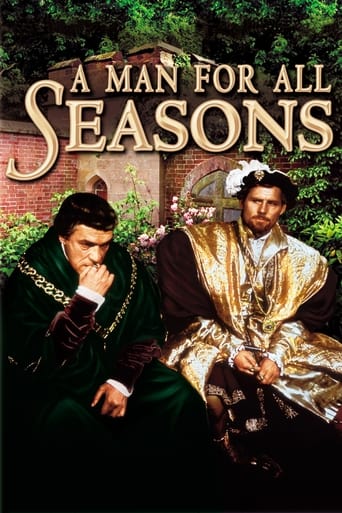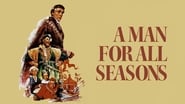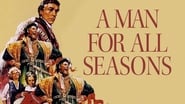epeairs-78150
When asked which of the 89 films that have won the Academy Award for Best Picture I consider to be the WORST I instantly think of this movie. This movie is awful for so many reasons. On the surface it is not a pretty movie (no grand shots like Ben-Hur or Lawrence of Arabia) nor is it a fun movie (like The Sound of Music or My Fair Lady). No this movie is a serious, overly done historical drama in which it's two most famous actors (Robert Shaw and Orson Welles) are hardly in the movie at all! On the surface it is very dry and not at all entertaining.Digging deeper does not help this movie either. The development of Thomas Moore, the protagonist, makes him less and less likable as the story goes on. He's sacrificing his family and everything he has for what he believes is right, but all he has to do is LIE and agree to let the king have his way and the conflict would be over. Instead he fights for a lost cause, fighting for the way things used to be instead of how they could be; a fight he should lose. He becomes ignorant and arrogant for this cause he knows is hopeless and causes his family to suffer because of him. Meanwhile I found the antagonist, Thomas Cromwell, to be very relatable as he is just trying to please the king and therefore keep the country stable. Yet the movie insists Cromwell is bad and Moore is good and it just isn't believable.The nail in the coffin, for me at least, is that this movie beat out Who's Afraid of Virginia Woolf?, the taboo-shattering movie that almost single-handedly killed the Hays Code. This movie appears to be a resistance to Virginia Woolf in fear of public outcry or something to such a dark movie. What this movie lacks in deep, relatable characters with realistic and understandable motives Virginia Woolf has. Thus, not only is A Man For All Seasons an underwhelming and mediocre film, it was also completely undeserving of ever winning the award for Best Picture. Not only that, Paul Scofield's win for best actor is highway robbery from Richard Burton performance in Virginia Woolf, I can't begin to imagine why Scofield won this award.But if you're the kind of person that enjoys a movie about a man from 500 years ago trying to destabilize his country by fighting for an old way of thinking then this is the movie for you.
Hotwok2013
Directed by one of the all-time great film directors Fred Zinnemann & with a really brilliant screenplay written by Robert Bolt, "A Man For All Seasons" is just about as perfect a movie as is possible to make. The movie gives an account of the conflict which took place in the 16th century between King Henry V111 & his Lord Chancellor Sir Thomas More, which eventually led to More's execution. Paul Scofield gives a towering acting performance as Sir Thomas More with Robert Shaw (also extremely good) as Henry V111. After the Pope in Rome refused to annul his marriage to Catherine Of Aragon the King separated himself from the Catholic Church & proclaimed himself head of the newly- created Church Of England. More refused to sign the Oath Of Supremacy acknowledging the King's position & also refused to countenance the divorce which would leave the King free to marry Anne Boleyn. The Duke of Norfolk (Nigel Davenport) tries to persuade him to sign a document sanctioning the divorce but More adamantly refuses. The Duke tells him that it doesn't really matter whether he believes in granting the King a divorce or not & that he should sign it anyway, "for fellowship". More answers him by saying, "And when we stand before God & you are sent to heaven for doing your conscience & I am damned & sent to hell for not doing mine, will you accompany me there for fellowship?". After he resigned as Lord Chancellor More maintained an attitude of silence before & during his trial regarding the kings divorce. His thinking was that by doing so they would be unable to gain a treason conviction against him. More hoped he would then be left alone to live out the remainder of his life in peace & quiet. However, the angry King wanted More's head & there was never any chance of that!. Thomas Cromwell (Leo McKern), the ruthless & unscrupulous chief minister to the King got an ambitious, young (& equally unscrupulous) nobleman Richie Rich (John Hurt) to bear false witness against Sir Thomas More which helped to convict him. Cromwell rewarded Rich for his treachery with a chain of office. When More sees it he finally breaks his silence. "Why Richie, isn't that the chain of office for the Ministry of Wales? It profits a man nothing that he sells his soul to the devil for all the world, but to do it for Wales!". As I said at the start Robert Bolt's screenplay is just brilliant. He took the movie's title from a writer & poet who knew him & lived during Sir Thomas More's lifetime. Robert Whittington described him thus:-"More is a man with an angel's wit & singular learning. I know not his fellow. For where is the man of such gentleness, lowliness & affability. And, as time requireth, a man of marvellous mirth & pastimes, & sometimes of sad gravity. A man for all seasons". Jonathan Swift wrote that More was "a man of the greatest virtue this kingdom ever produced". Just before the axe came down severing his head from his body More is reputed to have said, "I die the king's good servant, but God's first".
Spikeopath
Fred Zinnemann directs and Robert Bolt adapts the screenplay from his own play. It stars Paul Scofield, Wendy Hiller, Leo McKern, Robert Shaw, Orson Welles, Susannah York, Nigel Davenport and John Hurt. Music is by Georges Delerue and cinematography by Ted Moore. Plot has Scofield as Sir Thomas More, the man who refused to cede to the mighty machinations of King Henry VIII (Shaw).It's very much an actors movie, beautifully literate and costumed and photographed up to the nines. So not one for those more keen on the action orientated historical epic, then! The story is thriving on the anguish of Thomas More, who is torn between loyalty to his King and his own moral beliefs, the beliefs of his religion system and the potential damning of his soul. The political and religious machinations positively pulse throughout, vividly brought to life by a cast of great thespians (Scofield is as great as you have heard).Great credit has to go to Zinneman, one of the deserved recipients of the 6 Oscars the film garnered. He never lets the cast run away with things, no chewing the scenery or smell the fart acting, he keeps them in check and they respond by providing an utterly fascinating and compelling historical saga. But most of all, with all the royal pomp on show, it's the intelligence of the writing that shines brightest. The dialogue via the sharp script throws cloaks of suspicion over everything being played out. Religion and politics, huh, it's for the birds. Top film making. 8/10
g-bodyl
A Man for All Seasons is an excellent, dialog-driven film about a time in our history, which quite frankly, many people do not know about. The movie takes place in England at a time where monarchy prevailed and divorce was frowned upon. The film also has a main theme saying that silence sometimes can be louder than words. The film may be character- driven, but it is certainly a fascinating study of this time period. As a history buff, I can appreciate the kind of art this film is. People may find this dry, but I find it fascinating. This film is about a man named Sir Thomas More and his infamous silence opposing the corrupt King Henry VIII when he ignored the Roman Catholic Church in regards to divorcing his wife Catherine in order to marry Anne Boleyn. The film has a fine cast and they all do an excellent job. Paul Scofield was masterful as Thomas More and he breathed life into his character as we, members of the audience, learned how big silence can be. Robert Shaw gave a likable, over-the-top performance as King Henry VIII. Orson Welles delivered a fine performance as the cardinal. John Hurt, in one of his early roles, was great as the young Rich. Overall, A Man for All Seasons makes for a fine history lesson. Being somewhat familiar with this time period, I was able to gain more in- depth information about the kind of man Sir Thomas More was. The script was dialog heavy, but I felt like that was appropriate for the kind of film it is. I had a rich experience watching the movie and I hope others can appreciate this history lesson. My Grade: A





